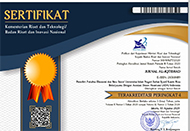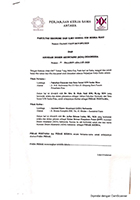Wakaf Tunai Berbasis Crowdfunding: Persepsi Generasi Y dan Z
Abstract
Penelitian ini bertujuan untuk melihat persepsi para milenial terhadap adanya wakaf tunai berbasis crowdfunding, sebagai generasi yang dominan menggunakan jasa teknologi, juga mengukur efektifitas dari sosoialisasi wakaf yang sudah dilakukan. Sehingga adanya persepsi tersebut dapat merepresentasikan potensi wakaf tunai di masa yang akan datang. Paper ini menggunakan 100 responden yang terdiri dari akademisi terkait ekonomi Islam. PLS digunakan untuk menjadi alat ukur yang menguji kecocokan model pada penelitian ini. Hasil penelitian ini menunjukkan bahwa factor religiusitas menjadi factor yang sangat mempengaruhi generasi X dan Z dalam menunaikan cash wakaf, selain itu adanya fasilitas fintech dalam pembayaran cash waqf juga dinilai sangat efisien. Penelitian ini dapat digunakan sebagai tolak ukur pengetahuan masyarakat terkait wakaf khususnya wakaf tunai berbasis crowdfunding.
Keywords
Full Text:
PDF (Bahasa Indonesia)References
Agreement, G., & Union, E. (2020). Crowdfunding As a Novel Financial Tool for District. 768936.
Ajzen, I. (1987). Attitudes, traits and actions: dispositional prediction of behaviour in social pshychology. Advances in Experimental Social Psychology, 20, 63.
Ajzen, I. (1991). The theory of planned behavior. ORGANIZATIONAL BEHAVIOR AND HUMAN DECISION PROCESSES, 50, 179–21. https://doi.org/10.15288/jsad.2011.72.322
Ajzen, I. (2012). The theory of planned behavior. Handbook of Theories of Social Psychology: Volume 1, January 2012, 438–459. https://doi.org/10.4135/9781446249215.n22
Akhtar, S., Irfan, M., Sarwar, A., Asma, & Rashid, Q. U. A. (2019). Factors influencing individuals’ intention to adopt mobile banking in China and Pakistan: The moderating role of cultural values. Journal of Public Affairs, 19(1), 1–15. https://doi.org/10.1002/pa.1884
Alam, S. S., Mohd, R., & Hisham, B. (2011). Is religiosity an important determinant on Muslim consumer behaviour in Malaysia? Journal of Islamic Marketing, 2(1), 83–96. https://doi.org/10.1108/17590831111115268
Amaliah, I., Aspiranti, T., & Purnamasari, P. (2015). The Impact of the Values of Islamic Religiosity to Islamic Job Satisfaction in Tasikmalaya West Java, Indonesia, Industrial Centre. Procedia - Social and Behavioral Sciences, 211(September), 984–991. https://doi.org/10.1016/j.sbspro.2015.11.131
Au-Yong-Oliveira, M., Gonçalves, R., Martins, J., & Branco, F. (2018). The social impact of technology on millennials and consequences for higher education and leadership. Telematics and Informatics, 35(4), 954–963. https://doi.org/10.1016/j.tele.2017.10.007
Budiati, I., Susianto, Y., Adi, W. P., Ayuni, S., Reagan, H. A., Larasaty, P., Setiyawati, N., Pratiwi, A. I., & Saputri, V. G. (2018). Profil Generasi Milenial Indonesia. 1–153. www.freepik.com
Che Hassan, S. N. A., & Rahman, A. A. (2018). The Potential of Cash Waqf in the Socio-economic Development of Society in Kelantan . New Developments in Islamic Economics, 67–82. https://doi.org/10.1108/978-1-78756-283-720181005
Che Zuina Ismail, Syafini Muda, & Nor Jawanees Ahmad Hanafiah. (2014). Challenges and Prospects of Cash Waqf Development in Malaysia. Journal of Basic and Applied Scientific Research, 4(2), 340–348.
Davis, F D. (1985). A technology acceptance model for empirically testing new end-user information systems: Theory and results. Management, Ph.D.(January 1985), 291. https://doi.org/oclc/56932490
Davis, Fred D. (1989). Perceived usefulness, perceived ease of use, and user acceptance of information technology. MIS Quarterly: Management Information Systems, 13(3), 319–339. https://doi.org/10.2307/249008
Eastman, J. K., Iyer, R., Liao-Troth, S., Williams, D. F., & Griffin, M. (2014). The role of involvement on millennials’ mobile technology behaviors: The moderating impact of status consumption, innovation, and opinion leadership. Journal of Marketing Theory and Practice, 22(4), 455–470. https://doi.org/10.2753/MTP1069-6679220407
Eid, R., & El-Gohary, H. (2015). The role of Islamic religiosity on the relationship between perceived value and tourist satisfaction. Tourism Management, 46, 477–488. https://doi.org/10.1016/j.tourman.2014.08.003
Fallis, A. . (2013). Factors Influencing Willingness To Contribute In Cash Waqf: Case Of South Tangerang, Indonesia. Journal of Chemical Information and Modeling, 53(9), 1689–1699. https://doi.org/10.1017/CBO9781107415324.004
Jalil, M. I. A., Pitchay, A. A., & Yahya, S. (2019). Cash Waqf and Preferred Method of Payment: Case of Malaysia Using an AHP Approach. Revitalization of Waqf for Socio-Economic Development, Volume II, January 2019, 187–206. https://doi.org/10.1007/978-3-030-18449-0_10
Johan, Z. J., & Putit, L. (2016). Conceptualizing the Influences of Knowledge and Religiosity on Islamic Credit Card Compliance. Procedia Economics and Finance, 37(16), 480–487. https://doi.org/10.1016/s2212-5671(16)30155-1
Kachkar, O. A. (2017). Towards the establishment of cash waqf microfinance fund for refugees. ISRA International Journal of Islamic Finance, 9(1), 81–86. https://doi.org/10.1108/IJIF-07-2017-007
Khamis, S. R., & Che Mohd Salleh, M. (2018). Study on the Efficiency of Cash Waqf Management in Malaysia. Journal of Islamic Monetary Economics and Finance, 4(1), 61–84. https://doi.org/10.21098/jimf.v4i1.732
Mcauley, D., & Weiner, S. (2015). The Millennial Generation and the Future of Finance: A Different Kind of Trust. June.
Mohd Thas Thaker, M. A. Bin, Amin, M. F. Bin, Mohd Thas Thaker, H. Bin, & Allah Pitchay, A. Bin. (2019). What keeps Islamic mobile banking customers loyal? Journal of Islamic Marketing, 10(2), 525–542. https://doi.org/10.1108/JIMA-08-2017-0090
Mohd Thas Thaker, M. A., Mohd Thas Thaker, H., & Allah Pitchay, A. (2018). Modeling crowdfunders’ behavioral intention to adopt the crowdfunding-waqf model (CWM) in Malaysia: The theory of the technology acceptance model. International Journal of Islamic and Middle Eastern Finance and Management, 11(2), 231–249. https://doi.org/10.1108/IMEFM-06-2017-0157
Mollick, E. (2014). The dynamics of crowdfunding: An exploratory study. Journal of Business Venturing, 29(1), 1–16. https://doi.org/10.1016/j.jbusvent.2013.06.005
Moore, M. (2012). Interactive media usage among millennial consumers. Journal of Consumer Marketing, 29(6), 436–444. https://doi.org/10.1108/07363761211259241
Nadya, P., Alwyni, F. A., & Iqbal, M. (2018). Strategy of Optimalization Cash Waqf In Indonesia. Jurnal Syarikah P-ISSN, 4(2), 108–121. https://doi.org/10.30997/jsei.v4i2.1501
Niswah, F. M., Mutmainah, L., & Legowati, D. A. (2019). Muslim Millennial’S Intention of Donating for Charity Using Fintech Platform. Journal of Islamic Monetary Economics and Finance, 5(3), 623–644. https://doi.org/10.21098/jimf.v5i3.1080
Noor, A. H. B. M., Isa, N. A. M., Irpan, H. M., Bahrom, H. Bin, Salleh, A. B. M., & Ridzuan, A. R. Bin. (2015). Characteristic Affecting Charitable Donations Behavior: Empirical Evidence from Malaysia. Procedia Economics and Finance, 31(15), 563–572. https://doi.org/10.1016/s2212-5671(15)01202-2
Personal, M., & Archive, R. (2013). Munich Personal RePEc Archive The Implication of Cash Waqf in the Society. 44605.
Pyöriä, P., Ojala, S., Saari, T., & Järvinen, K. M. (2017). The millennial generation: A new breed of labour? SAGE Open, 7(1). https://doi.org/10.1177/2158244017697158
Ramdhani, N. (2016). Penyusunan Alat Pengukur Berbasis Theory of Planned Behavior. Buletin Psikologi, 19(2), 55–69. https://doi.org/10.22146/bpsi.11557
Rijanto, A. (2018). Donation-based crowdfunding as corporate social responsibility activities and financing. Journal of General Management, 43(2), 79–88. https://doi.org/10.1177/0306307017748125
Rizal, H., & Amin, H. (2017). Perceived ihsan, Islamic egalitarianism and Islamic religiosity towards charitable giving of cash waqf. Journal of Islamic Marketing, 8(4), 669–685. https://doi.org/10.1108/JIMA-05-2015-0037
Rohmaningtyas, N., & Herianingrum, S. (2010). The significance of waqf in historical and teoritical studies. Journal of Islamic Economics Science, 1(1), 39–55.
Ryu, H. S. (2018). What makes users willing or hesitant to use Fintech?: the moderating effect of user type. Industrial Management and Data Systems, 118(3), 541–569. https://doi.org/10.1108/IMDS-07-2017-0325
Shaikh, S. A., Ismail, A. G., & Mohd Shafiai, M. H. (2017). Application of waqf for social and development finance. ISRA International Journal of Islamic Finance, 9(1), 5–14. https://doi.org/10.1108/IJIF-07-2017-002
Shneor, R., & Munim, Z. H. (2019). Reward crowdfunding contribution as planned behaviour: An extended framework. Journal of Business Research, 103(June), 56–70. https://doi.org/10.1016/j.jbusres.2019.06.013
Sulaiman, M., & Alhaji Zakari, M. (2019). Financial sustainability of state waqf institutions (SWIs) in Malaysia. Journal of Islamic Accounting and Business Research, 10(2), 236–258. https://doi.org/10.1108/JIABR-05-2016-0054
Syafira, F. N., Ratnasari, R. T., & Ismail, S. (2020). the Effect of Religiosity and Trust on Intention To Pay in Ziswaf Collection Through Digital Payments. Jurnal Ekonomi Dan Bisnis Islam (Journal of Islamic Economics and Business), 6(1), 98. https://doi.org/10.20473/jebis.v6i1.17293
Tan, J. D., Purba, J. T., & Widjaya, A. E. (2019). Financial Technology as an Innovation Strategy for Digital Payment Services in the Millenial Generation. 292(Agc), 364–373. https://doi.org/10.2991/agc-18.2019.58
Thoarlim, A., Rahman, M. A., & Yanya, A. (2017). Cash Waqf in Bangladesh and the Need for Innovative Approach towards Awqaf: Lessons from Selected Countries. International Journal of Academic Research in Business and Social Sciences, 7(4), 151–169. https://doi.org/10.6007/ijarbss/v7-i4/2795
Zacharis, N. Z. (2012). Predicting college students’ acceptance of podcasting as a learning tool. Interactive Technology and Smart Education, 9(3), 171–183. https://doi.org/10.1108/17415651211258281
Zamani-Farahani, H., & Musa, G. (2012). The relationship between Islamic religiosity and residents’ perceptions of socio-cultural impacts of tourism in Iran: Case studies of Sare’in and Masooleh. Tourism Management, 33(4), 802–814. https://doi.org/10.1016/j.tourman.2011.09.003
DOI: http://dx.doi.org/10.24014/jiq.v17i1.12580
Refbacks
- There are currently no refbacks.















